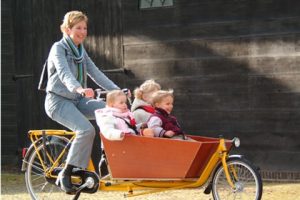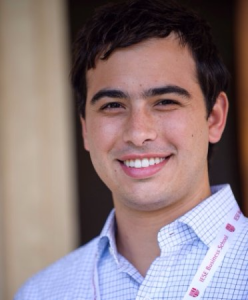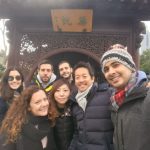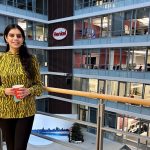Jean-Paul Destarac, MBA Class of 2018 recently participated in a Life Design Workshop organized by IESE MBA Career Services. The CS team regularly organizes such workshops throughout the year, aimed at helping students identify their career goals and better manage their own career path. Jean-Paul shares some of his learnings in this post.
When I first started considering an MBA, I spoke to many friends about their experiences in their programs. One theme that was often mentioned was that an MBA is a highly transformative experience. For many, this before and after was very tangible since they changed industries, moved to a new country, or got married. But several also pointed out that a more subtle transformation occurred in themselves as a person. I wanted to experience such a change as well, and knew that IESE was the perfect environment to make me the business leader and person I wanted to be.
Just as I was devoting countless hours to my coursework and learning, I knew I had to dedicate time to my personal growth. So when I was invited to attend the Life Design Workshop, I knew that even though it was only a two-day event, it would create some space in my MBA life to use design thinking methodologies to consider which direction I wanted my life to take and plan concrete steps to get there.
The attendees and I were fortunate to have Femke van der Veer as the coach for this session as she has been a designer for the past 20 years at leading corporations and an MBA herself, so understands our context. She began by articulating the aim: “Creating the life you want to live.” She stated, “By designing your life, you get clarity on direction, purpose, priorities, values, potential life and career scenarios, as well as deciding on concrete action steps.” The rest of the afternoon and following day were full of individual and group activities to brainstorm our individual responses to this question.

IESE Design Thinking Workshop participants
Before the course, we had some pre-work that forced us into thinking about what makes us happy, what we are proud of, what we admire in those around us, etc. When we arrived, with our answers in hand, Femke began passing out colored markers and asked us to draw a self-portrait as the person we always wanted to be when we grew up. Suddenly, we each became designers and had a fun time explaining our rudimentary designs to each other.
The rest of the workshop, we cycled through various sessions where we spent time thinking, drawing, or discussing with our classmates, contemplating where we want our life to lead. But what I found most useful about the program was involving others in designing our life.
One of the exercises we did was writing the name of the career we felt we were most likely to begin post-MBA. Then we surrounded that career with words that came to our mind when we thought of it. For example, one student was interested in consulting and around consulting wrote: learning, high-pace, variety, travel, mentoring, etc. And we did this again with each of those words. After a couple of iterations, we circled three words that we liked from all the ones on our paper.
Then on a new sheet we wrote those three words and created a quadrant. For that consultant, the words that stood out were learning, speed, and variety. Without giving any additional information, we passed that paper to our neighbor and asked him or her to write down careers that they thought could align with those three adjectives. And did this again until the quadrant was full.

The outcome of the personal exercise
It was humorous to receive the paper back and see what our classmates suggested for careers based on those three words. People in the classroom got everything from investment banker to professional chef, mountain climber to consultant. We realized that by trying to expand our horizons and using the brainpower of our colleagues, industries we never expected to enter were suggested to us. And some we already anticipated entering, surfaced as well.
The whole idea behind such exercises was to think beyond what we believed were the norms. Generally, when thinking about our careers, we close ourselves off. The example Femke mentioned was: “I want a red Ferrari.” Instead of a red Ferrari, what we may want is “How to get from A to B in a comfortable manner with up to four people, while feeling good about myself and attracting admiration from others.” By opening the question in this way, we expand our thinking to include many more solutions than simply the Ferrari. Rather than just dreaming of the Ferrari, we may realize that the answer to that question can also be a typical Dutch bike with a child carrier, as Femke mentioned.

Thinking outside the box
Similarly, as MBA students planning our careers, we can accidentally frame our needs and wants as solutions. We come up with the idea that we want to work in Company A or in Industry X, but by using design thinking methodologies and questioning what we like about that company or industry, we may realize that there are many solutions to our quest we hadn’t considered.
Before this workshop, I had very minimal experience with design thinking but this session reminded me that many of the tools we are using for business, do not need to be a siloed part of our life. They can be applied very practically to our personal life. And thus, in the MBA, we will not just learn how to create better business but better people. And we can start with ourselves.
Thank you Jean-Paul!
Would you like to find out more about IESE MBA’s full time program? Click here.
To get informal feedback on your profile, click here. To apply online, click here.








Due to their qualification, graduates of an MBA programme have higher chances of obtaining and holding a high-level management position. More than 50% of the MBA graduates worldwide are senior managers or board directors. This type of position brings along a higher salary but of course also a higher responsibility and longer working hours.
An interesting seminar, please tell me how to participate in this workshop, thank you
Inspirational stuff JeanPaul.
This our life skills that need to be remembered throughout life, especially when study turns into work and employers are demanding results.